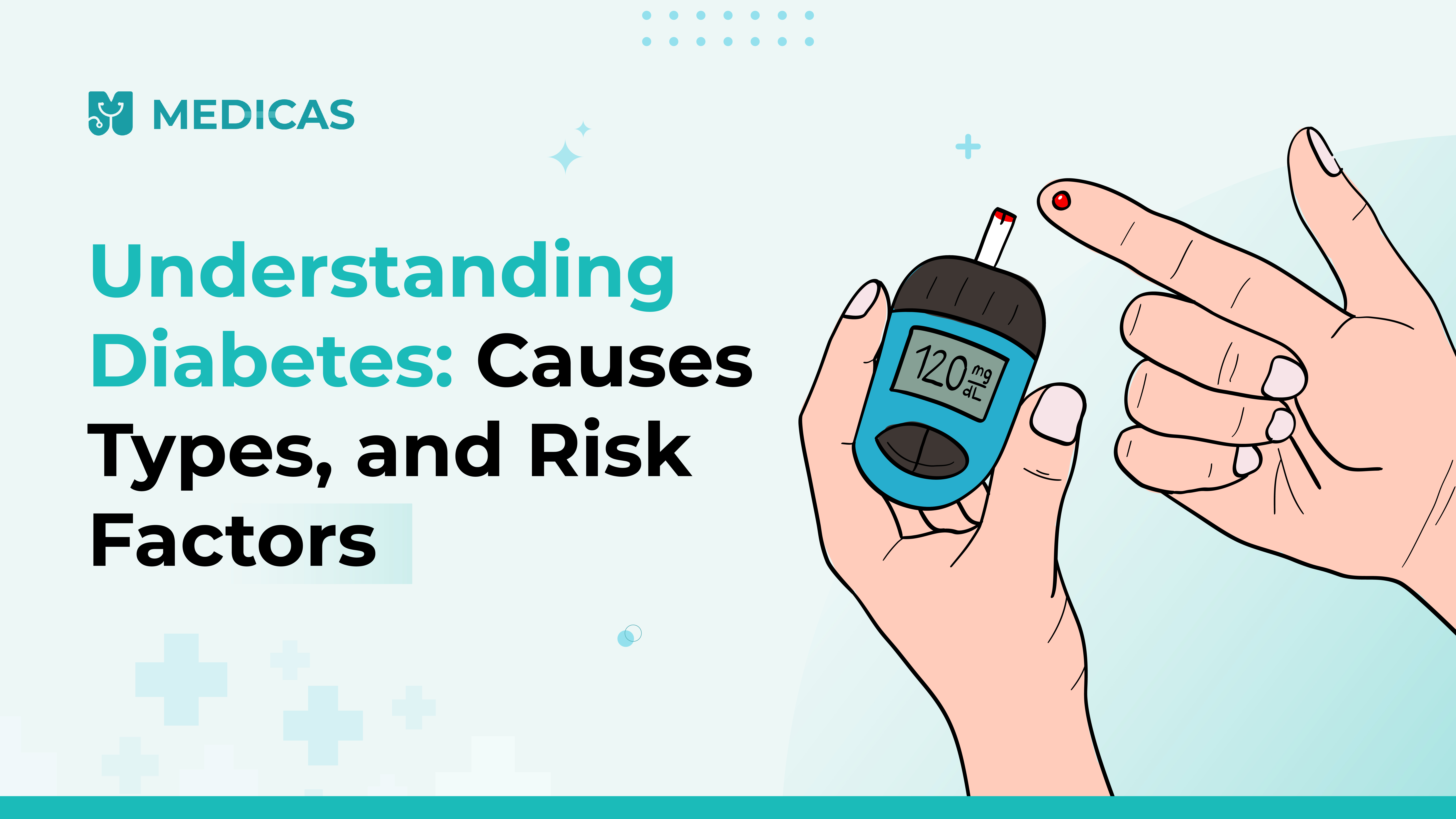Introduction
Diabetes is a prevalent and concerning health condition affecting millions of people. Whether you are already living with diabetes or want to safeguard yourself against its onset, understanding the causes, types, and risk factors is crucial.
In this blog, we will delve into the fundamentals of diabetes, empowering you with valuable knowledge to make informed decisions about your health.
What is Diabetes?
Diabetes is a chronic metabolic disorder characterized by elevated blood glucose levels, commonly referred to as high blood sugar.
The hormone insulin, produced by the pancreas, plays a vital role in regulating blood sugar levels and converting glucose into energy for the body’s cells.
3 Types of Diabetes
There are primarily three types of diabetes:
- Type 1 Diabetes: This type is an autoimmune condition, where the body’s immune system attacks and destroys the insulin-producing cells in the pancreas. As a result, people with Type 1 diabetes require insulin injections or an insulin pump to manage their blood sugar levels effectively.
- Type 2 Diabetes: Type 2 diabetes is the most prevalent form and occurs when the body becomes resistant to insulin or does not produce enough of it. Lifestyle factors, such as poor diet, sedentary habits, and obesity, often contribute to the development of Type 2 diabetes.
- Gestational Diabetes: Gestational diabetes occurs during pregnancy and affects some women. Although it usually resolves after childbirth, women with gestational diabetes have an increased risk of developing Type 2 diabetes later in life.
8 Risk Factors for Diabetes
Several factors increase the risk of developing diabetes:
- Family History: Having a family member with diabetes raises the risk of the condition.
- Obesity: Excess body weight, especially around the abdomen, is a significant risk factor for Type 2 diabetes.
- Sedentary Lifestyle: Lack of regular physical activity can lead to insulin resistance.
- Unhealthy Diet: Consuming a diet high in calories, refined sugars, and unhealthy fats may elevate blood sugar levels.
- Age: The risk of Type 2 diabetes increases with age, particularly after the age of 45.
- Ethnicity: People of Caribbean, Hispanic, African, or Asian descent have a higher susceptibility to diabetes.
- High Blood Pressure: Hypertension is associated with an increased risk of diabetes.
- Polycystic Ovary Syndrome (PCOS): Women with PCOS are more prone to developing diabetes.
4 Preventive Measures
For those at risk or looking to prevent diabetes, adopting a healthy lifestyle is paramount:
- Balanced Diet: Emphasize whole grains, fruits, vegetables, lean proteins, and healthy fats in your diet.
- Regular Exercise: Engage in regular physical activity to improve insulin sensitivity and maintain a healthy weight.
- Weight Management: Achieve and maintain a healthy weight to reduce the risk of diabetes.
- Avoid Smoking and Excessive Alcohol: Smoking and heavy alcohol consumption can exacerbate diabetes risks.
Conclusion
Empowering yourself with knowledge about the causes, types, and risk factors of diabetes is essential for proactively managing your health. Whether you are already living with diabetes or want to prevent its onset, embracing a healthy lifestyle can significantly impact your well-being.
Remember to consult with healthcare professionals for personalized advice and guidance on managing diabetes.
Together, let us take proactive steps towards a healthier community by raising awareness and promoting preventive measures for diabetes. With the right information and commitment to a healthy lifestyle, we can work towards a brighter and healthier future for ourselves and our loved ones.
Frequently Asked Questions (FAQs)
- What is the main cause of diabetes?
A: Diabetes is primarily caused by a combination of genetic predisposition and lifestyle factors. In type 1 diabetes, the immune system mistakenly attacks and destroys insulin-producing cells in the pancreas. Type 2 diabetes is often linked to lifestyle factors such as poor diet, sedentary habits, and obesity. - What is normal blood sugar?
A: Normal blood sugar levels typically range between 70 to 130 mg/dL before meals and below 180 mg/dL two hours after meals. However, optimal targets may vary based on individual circumstances and diabetes type. - What are the 10 warning signs of diabetes?
A: The warning signs of diabetes include frequent urination, excessive thirst, unexplained weight loss, increased hunger, fatigue, blurred vision, slow-healing wounds, frequent infections, tingling or numbness in hands and feet, and irritability. - What are the 4 risk factors for diabetes?
A: The main risk factors for diabetes include being overweight or obese, having a family history of diabetes, leading a sedentary lifestyle, and having a history of gestational diabetes. - Is diabetes curable?
A: While diabetes cannot be “cured” in the traditional sense, it can be effectively managed and controlled through lifestyle modifications, medication, and regular monitoring. With appropriate care, individuals can lead healthy life and reduce the risk of complications. - What are the causes and prevention of diabetes?
A: Type 1 diabetes is believed to be caused by genetic factors and certain environmental triggers, while type 2 diabetes is closely associated with lifestyle choices, including unhealthy eating habits and lack of physical activity. Preventive measures for type 2 diabetes include maintaining a healthy weight, eating a balanced diet, being physically active, and avoiding tobacco use.
Remember, it is essential to consult a healthcare professional for personalized advice and guidance regarding diabetes management, prevention, and treatment. Early detection and proactive care can significantly improve the quality of life for individuals living with diabetes.
Disclaimer
Medical Advice: The information provided in this blog post is for educational purposes only and should not be considered as a substitute for professional medical advice, diagnosis, or treatment. Always consult with a qualified healthcare professional for personalized guidance regarding your specific medical condition.
Accuracy of Information: While we strive to provide accurate and up-to-date information, the field of medicine and viral fevers is constantly evolving. The content in this blog post may not reflect the most current research or medical guidelines. Therefore, it is advisable to cross-check any information provided with reliable sources or consult a healthcare professional.
Individual Variations: The symptoms, causes, treatment options, and preventive measures discussed in this blog post are general in nature and may not apply to everyone. It is important to remember that each individual’s situation is unique, and personalized medical advice should be sought when making healthcare decisions.
External Links: This blog post may contain links to external websites or resources for additional information. However, we do not endorse or have control over the content of these third-party websites. Accessing these links is done at your own risk, and we are not responsible for any consequences or damages that may arise from visiting these external sources.
Results May Vary: The effectiveness of treatment options or preventive measures mentioned in this blog post may vary from person to person. What works for one individual may not work the same way for another. It is essential to consult with a healthcare professional for personalized advice tailored to your specific needs.



